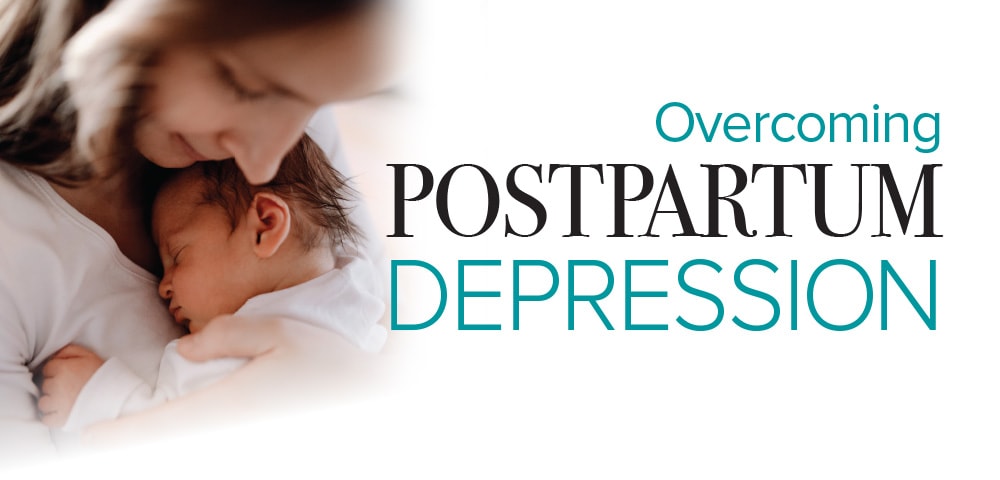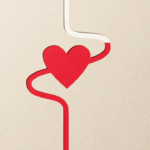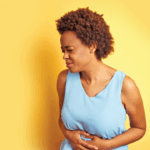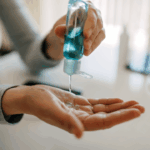
Becoming a new parent brings a host of feelings. Happiness, excitement, worry, and feeling overwhelmed are very common emotions that can occur when a new life becomes part of a family. With the multiple changes that can take place, up to 75% of mothers may experience the "baby blues." Feeling tired, unsure, and anxious, plus crying for no reason, are common during this time.
Often beginning a few days after childbirth, the “baby blues” can last for a few weeks and generally resolves on its own. However, around 7–20%, of mothers in the US experience a more intense condition known as postpartum depression (PPD).[1] Lasting more than two weeks, PPD is a major depressive disorder that can begin during pregnancy, or within four weeks and up to one year postpartum (after birth).[2] Common signs and symptoms associated with PPD include a depressed mood, sleep deprivation, changes in weight or appetite, loss of interest in things that would normally bring pleasure, feelings of guilt worsened by not bonding with baby, irritability, concentration difficulties, and recurrent thoughts of death or suicide.[3] Without a doubt, women who experience these signs and symptoms, must seek advice from their health professional for proper evaluation and support.
There is no sole cause for postpartum depression. Rather its occurrence may be due to a combination of biological, social, genetic, and psychological factors.[2] Causes may include hormonal imbalances, hypothalamic-pituitary-adrenal (HPA) axis dysfunction, abnormalities of maternal brain chemicals (neurotransmitters), thyroid concerns and genetic susceptibility.[2,4] As there is no single factor that contributes to PPD, there is also no single treatment suitable for each woman. Every mother has her very own trigger(s) and thus must be cared for individually. Solutions for the prevention and treatment of PPD may include home health visits, psychotherapy, social support from family and friends, pharmaceutical treatment, exercise, acupuncture, massage, nutrition, and/or certain natural health products. As you work with your health care team to determine your best path to health, consider these important steps for a healthy postpartum period.
UP TO 75% OF MOTHERS MAY EXPERIENCE THE “BABY BLUES.”
1 SECURE SUPPORT
You are not alone. Emotional, mental, and physical well-being during pregnancy and beyond strongly depends on the support provided from family, friends, and community members. A lack of social support can be associated with postpartum depression, and research has shown that the bigger the social network a mother has, the less postpartum depression occurs.[5,6] This support is critical to adjusting to not only new childcare responsibilities, but also the tasks and emotions of everyday life. The inclusion of psychological counseling and interventions like cognitive behavioural therapy has also been shown to provide numerous benefits such as reducing the number of individuals with PPD and improving symptoms associated with the condition.[7] Secure your support by talking to others, especially other mothers who have experienced PPD. Also reach out to family and friends for help with household tasks and child care, and seek professional therapy for further support.
THE RESEARCH HAS SHOWN THAT THE BIGGER THE SOCIAL NETWORK A MOTHER HAS, THE LESS POSTPARTUM DEPRESSION OCCURS.
2 GET MOVING
 In the weeks following childbirth, it’s important to take it easy. Relax and sleep as much as you can! When it’s safe to do so, start to engage in physical exercise. Research has shown that physical activity during pregnancy and the postpartum period is a safe approach to achieve better psychological well‐being and to reduce postpartum depressive symptoms.[8,9] In one randomized trial, one group of mothers were assigned to an 8-week “Mother and Baby” program that included exercise and parenting education, while another group received the parent education only. [10] At the end of the trial, there was significant improvement in well-being scores and depressive symptoms in the exercise and education group compared to those who only received the education. These effects lasted for four weeks after the program’s completion and there was a 50% reduction in the number of women who were at risk for PPD.
In the weeks following childbirth, it’s important to take it easy. Relax and sleep as much as you can! When it’s safe to do so, start to engage in physical exercise. Research has shown that physical activity during pregnancy and the postpartum period is a safe approach to achieve better psychological well‐being and to reduce postpartum depressive symptoms.[8,9] In one randomized trial, one group of mothers were assigned to an 8-week “Mother and Baby” program that included exercise and parenting education, while another group received the parent education only. [10] At the end of the trial, there was significant improvement in well-being scores and depressive symptoms in the exercise and education group compared to those who only received the education. These effects lasted for four weeks after the program’s completion and there was a 50% reduction in the number of women who were at risk for PPD.
Either on your own or with other mothers, engage in a variety of activities such as walking, swimming, yoga, and strength-training exercises. Keep the activities comfortable and fun!
3 SUPPORT THE GUT BRAIN CONNECTION
There is a very important connection between our brain and our gut known as the “gut-brain axis.” In fact, the gut is often referred to as the “second brain.” The microbiota in the gut (healthy bacteria) can communicate to the brain through different mechanisms. One way is through the production of neurotransmitters such as serotonin, dopamine, and GABA, which play a significant role in regulating mood.[11]
The gut microbiota may also impact stress reactions by influencing the activity of the HPA axis and the release of stress hormones.[12]
When the gut microbiota is balanced, and the HPA axis is normalized, stress hormones are reduced. Therefore, supporting a healthy microbiota may play an important role in improving overall brain function and mood. The use of prebiotic and probiotic foods, and probiotic supplements are key to maintaining a healthy microbiota. One particular probiotic strain, Lactobacillus rhamnosus HN001, has been shown to significantly lower depression and anxiety during the postpartum period.[13] Support your gut-brain connection by consuming more foods such as yogurt, kefir, miso, sauerkraut, and kombucha, and consider the use of a high-quality probiotic supplement.
THE USE OF PREBIOTIC AND PROBIOTIC FOODS, AND PROBIOTIC SUPPLEMENTS ARE KEY TO MAINTAINING A HEALTHY MICROBIOTA.
4 FOOD FOR YOUR MOOD
Overall mental health can be supported by following a diet that provides key nutrients for brain health.[14] Fundamental strategies include incorporating an anti-inflammatory diet, consuming nutrients that support neurotransmitter production, and as discussed, supporting a healthy microbiota.[14] Although it can be challenging to monitor what you are eating as you adjust to life with a new baby, it can be very helpful to follow a nutrition plan that incorporates high-quality proteins, in-season fruits and vegetables, unrefined grains and healthy fats. Drinking water, bone broth, and herbal teas is also beneficial, while avoiding sugar, trans fats, refined carbohydrates, and processed meats. There are also associations between an increased risk for PPD and low intake of nutrients such as folate, B-vitamins, iron, omega-3 fatty acids, and vitamin D.[15-18] Unfortunately food sources may not always be enough to meet the daily needs of these nutrients, so look to incorporate nutritional supplements to avoid deficiencies that may increase your risk of postpartum depression.
Postpartum depression can not only affect mothers, but also fathers. If you, or someone you know, is at risk or suffering from PPD, remember that there are solutions. Take the first step and speak to your health professional. Remember to care for yourself and secure support from others. Although it might take time, you can experience positive changes and enjoy life with your family.
References
- Statistics Canada. Maternal Mental Health in Canada, 2018/2019. Released June 24, 2019. Available from https://www150.statcan.gc.ca/n1/en/daily-quotidien/190624/dq190624b-eng.pdf?st=R7snNSKX
- Langan R, Goodbred AJ. Identification and Management of Peripartum Depression. Am Fam Physician. 2016; 93(10):852-858.
- The Centre for Addiction and Mental Health. Postpartum Depression. Available from https://www.camh.ca/en/health-info/mental-illness-and-addiction-index/postpartum-depression
- Schiller CE, Meltzer-Brody S, Rubinow DR. The role of reproductive hormones in postpartum depression. CNS Spectr. 2015; 20(1):48-59.
- Corrigan CP, Kwasky AN, Groh CJ. Social Support, Postpartum Depression, and Professional Assistance: A Survey of Mothers in the Midwestern United States. J Perinat Educ. 2015; 24(1):48-60.
- Vaezi A, Soojoodi F, Banihashemi AT, et al. The association between social support and postpartum depression in women: A cross sectional study. Women Birth. 2019; 32(2):e238-e242.
- Huang L, Zhao Y, Qiang C, et al. Is cognitive behavioral therapy a better choice for women with postnatal depression? A systematic review and meta-analysis. PLoS One. 2018; 13(10):e0205243.
- Poyatos‐León, R, García‐Hermoso, A, Sanabria‐Martínez, G, et al. Effects of exercise‐based interventions on postpartum depression: A meta‐analysis of randomized controlled trials. Birth. 2017; 44: 200‐208.
- Heh SS, Huang LH, Ho SM, et al. Effectiveness of an exercise support program in reducing the severity of postnatal depression in Taiwanese women. Birth. 2008; 35(1):60-65.
- Norman E, Sherburn M, Osborne RH, et al. An exercise and education program improves well-being of new mothers: a randomized controlled trial. Phys Ther. 2010; 90(3):348-355.
- Strandwitz P. Neurotransmitter modulation by the gut microbiota. Brain Res. 2018; 1693(Pt B):128-133.
- Farzi A, Fröhlich EE, Holzer P. Gut Microbiota and the Neuroendocrine System. Neurotherapeutics. 2018; 15(1):5-22.
- Slykerman RF, Hood F, Wickens K, et al. Effect of Lactobacillus rhamnosus HN001 in Pregnancy on Postpartum Symptoms of Depression and Anxiety: A Randomised Double-blind Placebo-controlled Trial. EBioMedicine. 2017; 24:159-165.
- Lachance L, Ramsey D. Food, mood, and brain health: implications for the modern clinician. Mo Med. 2015; 112(2):111-115.
- Ellsworth-Bowers ER, Corwin EJ. Nutrition and the psychoneuroimmunology of postpartum depression. Nutr Res Rev. 2012; 25(1):180-192.
- Sparling TM, Nesbitt RC, Henschke N, et al. Nutrients and perinatal depression: a systematic review. J Nutr Sci. 2017; 6:e61.
- Hsu MC, Tung CY, Chen HE. Omega-3 polyunsaturated fatty acid supplementation in prevention and treatment of maternal depression: Putative mechanism and recommendation. J Affect Disord. 2018; 238:47-61.
- Aghajafari F, Letourneau N, Mahinpey N, et al. Vitamin D Deficiency and Antenatal and Postpartum Depression: A Systematic Review. Nutrients. 2018;10(4):478.












